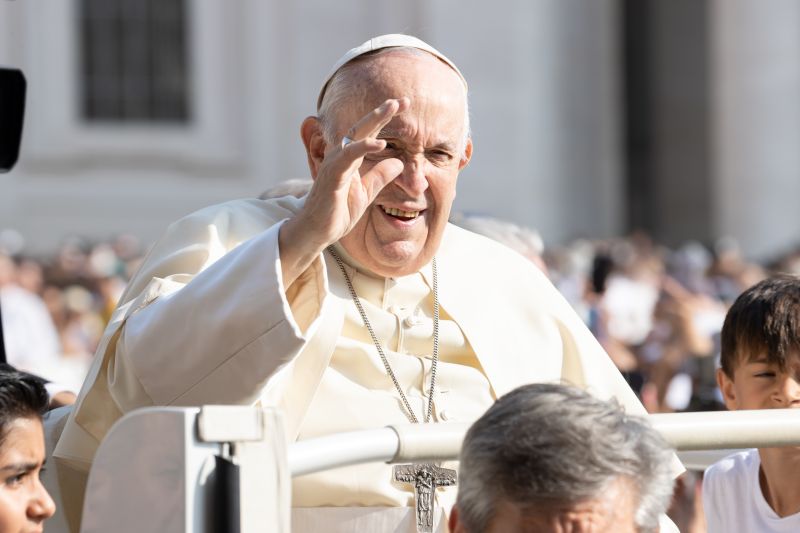
Vatican City, Nov 30, 2018 / 01:23 pm (CNA).- On the feast of St. Andrew the Apostle, Pope Francis told the Ecumenical Patriarch of Constantinople that while the Holy Spirit has in recent years prompted a “fraternal dialogue” between the Catholic and Orthodox Churches, both Churches should work to achieve full communion with one another.
“While centuries of mutual misunderstanding, differences and silence may seem to have compromised [the relationship between the Catholic and Orthodox Church], the Holy Spirit, Spirit of unity, has enabled us to recommence a fraternal dialogue,” the pope wrote.
“This was definitively resumed by our venerable predecessors, Patriarch Athenagoras and Pope Saint Paul VI, and has enabled us to rediscover those bonds of communion that have always existed between us.”
“The search for the re-establishment of full communion is above all a response to the will of our Lord Jesus Christ, who on the eve of his Passion prayed that his disciples ‘may all be one,’” the pope added.
The Ecumenical Patriarch of Constantinople, the de facto leader of Orthodox Christianity, is believed to be the successor of St. Andrew. While the various Orthodox Churches around the world are not subject to his administrative authority, he is generally regarded as primus inter pares, or “first among equals” in relationship to the patriarchs of other Orthodox Churches.
The current patriarch is Bartholomew I, who has held the position since 1991, and is widely seen to have fostered collaborative dialogue with Pope Francis and his predecessors, Pope Benedict XVI and Pope St. John Paul II.
The pope’s greetings come amid a difficult year for Orthodoxy. In October, the Russian Orthodox Church, the largest of the Orthodox Churches, broke communion with the Patriarch of Constantinople, after a disagreement about the state of the Orthodox Church in Ukraine. While the Patriarch of Constantinople made moves to recognize the autonomy of the Orthodox Church in Ukraine, the Patriarchate of Moscow insisted that Orthodox Ukrainians remain subject to its jurisdiction.
Russian Orthodox Christians are, by some estimates, more than half of the total number of Orthodox Christians around the world.
While Pope Francis did not specifically address the Orthodox rift, he did write that “in a world wounded by conflict, the unity of Christians is a sign of hope that must radiate ever more visibly.”
Pope Francis also wrote that, despite theological differences, “both Churches, with a sense of responsibility towards the world, have sensed that urgent call, which involves each of us who have been baptized, to proclaim the Gospel to all men and women. For this reason, we can work together today in the search for peace among peoples, for the abolition of all forms of slavery, for the respect and dignity of every human being and for the care of creation.”
“With God’s help, through encounter and dialogue on our journey together over the last fifty years, we already experience being in communion, even though it is not yet full and complete.”
If you value the news and views Catholic World Report provides, please consider donating to support our efforts. Your contribution will help us continue to make CWR available to all readers worldwide for free, without a subscription. Thank you for your generosity!
Click here for more information on donating to CWR. Click here to sign up for our newsletter.




Through a valid Eucharist, they all experience an imperfect communion.
Meanwhile, what has the bishop of Rome done to advance reunion with the Orthodox in the areas of dogmatics, liturgy, and ecclesiology?
Holy Andrew, pray for us!
The Orthodox are very irritated by the fact that when our modern calendar was introduced, it ended up changing the date of Easter that was based on the old calendar. Since this had been agreed on at Nicea (using the old calendar)in the first ecumenical council, they blame the Catholics for changing the date unilaterally. Given their disunity, it would be impossible for them to change the date in unison. If the Pope agreed to return to the old date, this would remove a major irritant in ecumenical relations with them. I think that the WCC would agree for the sake of peace.
To this non-theologian observer, the path to reunion between our Latin Catholic Church and (some of?) the Orthodox Catholic Churches might include paving stones such as these:
1. The possible THEME that Peter and Andrew were brothers (the patriarch of Constantinople is regarded as the successor to St. Andrew),
2. Pope Benedict XVI’s beatification of John Henry Cardinal Newman (2010) who, like the Orthodox, saw the unfathomable mystery of the INCARNATION as the most central fact of Christianity (not to diminish the other central facts of the Crucifixion and Resurrection stressed more in the West),
3. ATTENTION in the West to Duns Scotus (beatified by St. Pope John Paul II in 1993) who, unlike St. Thomas Aquinas, believed that the ultimate reason the Second Person would have entered into his creation (even without the Fall) is His ultimate goodness, with the proximate reasons then including worship of the Father and “deification” of rational creatures—neither of which is the totally gratuitous damage-control of Redemption after the Fall (Rev. Carol’s very thorough “Why Jesus Christ?” elaborates more accurately and in great detail, and cites the names and words of some 1,179 Scotists and even 307 Thomists(!), with further supplemental lists identified and annexed.
4. SYNODALITY done right (after some recent and discrediting false starts), which looks a little more like the eastern patriarchal structure, but with papal primacy unambiguous and intact (the successors of St. Peter),
5. Selection of a galvanizing FUTURE DATE for some kind of joint action, probably engaging a future pope; Pope Francis has previously pointed to the 1700th anniversary of Nicaea (2025 A.D.).